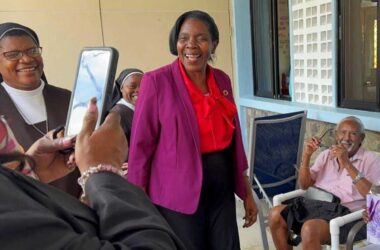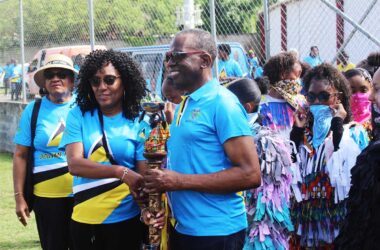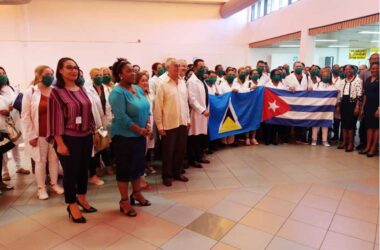Executive Director of the National Community Foundation (NCF), Michelle Phillips, says that even as the COVID-19 pandemic continues to disrupt many lives and livelihoods, there are key lessons that can be learned during these challenging times.
Phillips’ sentiments came on the heels of the recently-held Brian Bernard Memorial Lecture that sought to provide crucial advice to mothers who might be encountering challenges instilling values in their children’s lives.
The annual lecture is named after former Police Commissioner, Brian Bernard, who retired on August 12, 2003, after serving in the Royal Saint Lucia Police Force (RSLPF) with distinction for over three decades.
Bernard was born on August 12, 1948, and enlisted in the RSLPF on August 16, 1968. He served in many capacities before being appointed Commissioner of Police on March 1, 2001. His career in the RSPLF was described as being one of dedication, commitment, loyalty, and respect for authority. He died in September 2003 at age 55.
The Brian Bernard Memorial Fund was established in his honour on August 12, 2004, for his contribution to humanity. The Fund is administered by the NCF and focuses on enforcing and/or enhancing ethical behaviour and human and Christian values. Since it was first held in 2005, the lecture has been hosted annually by the NCF from donations to the Fund.
Among the Fund’s objectives are strengthening ethics within communities by inspiring people and institutions to act ethically towards each other. This is done through education, advocacy and research.
One way to achieve this objective is to offer educational opportunities geared towards building one’s character to become better persons and community members. The Virtues Program, which was introduced as the bedrock of this Fund, is intended to provide empowering strategies that inspire the practice of virtues in everyday life, including the classroom.
“The concept of the Virtues Project is that if you teach people to speak, act and treat each other respectfully and virtuously, it would engender positive behaviours that would redound to the elimination of many of the socio-economic issues we see arising in our society,” Phillips said. “A significant part of the NCF’s mandate is to implement and fund programmes that seek to eliminate socio-economic issues, among other things, and The Virtues Project is significant tool which lends itself to achieving this mandate.”
Historically, the NCF would host a Brian Bernard Memorial Lecture annually whereby a featured guest would speak on a particular topic – not necessarily solely on the virtues. In 2018, the lecture targeted Forms 4 and 5 students in the NCF’s scholarship programme. No lectures were held in 2019 and 2020. However, the NCF decided to focus this year’s lecture on the mothers of students in its scholarship programme whom the NCF engaged in a previous activity in January 2020.
“We recognised that some of the issues that we are seeing in the performance of some of our scholarship students stemmed from there being a disconnect in the transition between school and home life. As a result, we chose to work with the mothers first, to hear their stories in an environment that gave them an opportunity to speak freely and to give us the chance to present research that enlightened them about the differences between dealing with children today as opposed to how they had grown up,” Phillips explained.
This year’s lecture was hosted via Zoom on Thursday, October 21, with the aforementioned mothers. The featured speaker was Tara Leonard-Emmanuel, who used her training skills coupled with knowledge garnered from The Virtues Project to deliver on this year’s theme, “Applying unchanging virtues to cope in this continuously changing world”.
Other attendees at the interactive session included the principal donor to the Fund, Hon. Emma Hippolyte, Minister for Commerce, Manufacturing, Business Development, Cooperatives and Consumer Affairs; NCF Board Members; NCF Staff; and other invited guests.
According to the NCF Executive Director, one of the inescapable truths about the pandemic is the need for a complete reset and rethinking of priorities and modes of human interaction. She believes that while the economic situation cannot be discounted, people also need to be more introspective.
“I think we’ve been taught so many lessons during the COVID-19 pandemic; however, I also think that people are not embracing the right lessons,” Phillips stated. “Instead of looking forward hopefully and changing the way we do things for a better future, people are holding on to thoughts and images of a world that no longer exists and hoping for things to return to the pre-pandemic ‘normal’, hence our theme for this year’s Lecture was specifically chosen in an effort to provide one of the tools required to embrace this paradigm shift.”
In an article first published in Police Week Magazine in 2002, entitled “The Question of Ethics”, Bernard wrote the following: “As police officers, our ethical conduct will always be under scrutiny, more so than other public officers. Therefore, we must live our lives like Caesar’s wife. We must be above reproach. The Holy Bible, one of the oldest books written, also makes reference to ethical conduct.”
In the penultimate paragraph of that article, the late top cop urged police officers to champion the cause of integrity and professionalism. He was speaking directly to young police officers when he said: “The challenges facing any young officer are great. The temptations are all around. There is an increase in unethical conduct, for example, white-collar crime, drugs, fraud, corruption, vengeance, greed and basic immoral conduct in business. One has to balance between the society he grew in, the indications of the collapsed moral standards and the training he was exposed to.”
Over the years, the lectures have been delivered by many luminaries, including Justice Suzie d’Auvergne (2006), Dr. Ernest Hilaire (2008), Dr. Stephen King (2009), Fr. Michel Francis (2010), Professor Rose-Marie Belle Antoine (2011), and Dr. Urban Seraphin (2014).
To make a contribution to the Brian Bernard Memorial Fund – or any of the other Funds the NCF administers – contact the National Community Foundation at 1 (758) 453 6661 or 1 (758) 456 0997.







![Amy Stephen [Photo credit: Community Tourism Agency]](https://thevoiceslu.com/wp-content/uploads/2026/01/Amy-Stephen-feat-380x250.jpg)





